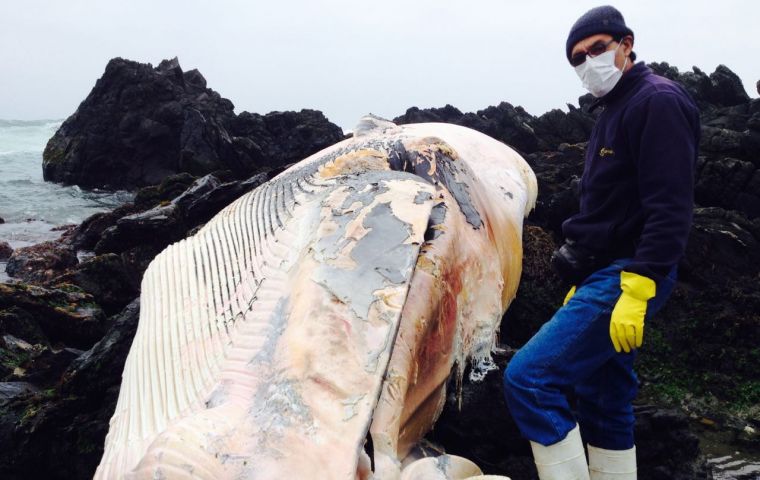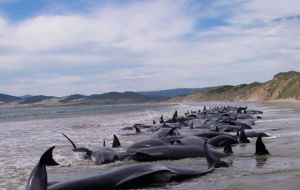MercoPress. South Atlantic News Agency
Scientists trying to determine the increase of whales' beaching all along Chile's coastline
 Last weekend a 14-meter fin whale was found dead on rocks at a beach in the city of Coquimbo, which prompted experts from Sernapesca to investigate.
Last weekend a 14-meter fin whale was found dead on rocks at a beach in the city of Coquimbo, which prompted experts from Sernapesca to investigate.  In December scientists were shocked by the discovery of 330 whales on a remote beach in the south of Chile
In December scientists were shocked by the discovery of 330 whales on a remote beach in the south of Chile Several huge whales have washed up dead over recent months on beaches in northern Chile, where scientists suspect they are moving in increasing numbers due to climate change. After the beaching of hundreds of dead whales in the south last year, the trend has now shifted to areas where the phenomenon was previously rare.
Last weekend a 14-meter fin whale was found dead on rocks at a beach in the city of Coquimbo. That prompted experts from the state National Fisheries and Aquiculture Service (Sernapesca) to investigate. They say sea creatures in the Pacific off Chile's coast are acting unusually.
“We have detected a rise in recorded cases of beached whales on the coast, which is not normal,” Sernapesca biologist Gerardo Cerda said on Wednesday.“It is strange to see this kind of incident” in the north, he said.
There have been three beaching in the region reported this year and six in 2015, Sernapesca said in a statement.
The whales migrate north from November to March during the southern winter, gathering in a marine reserve area around the Charanal Islands. Whale numbers there have swelled over recent years, possibly drawn by a growth in the number of krill—a crustacean prized by the cetaceans.
“There has been an increase in marine life in the area, possibly due to climate change,” said Frederick Toro, a conservation medicine professor at Andres Bello University.
“That may have increased the diversity of the whales,” he added. The rise in whales beaching may be a natural consequence of these greater numbers of whales in the region, Cerda said.
In the case of the fin whale found this weekend, he said investigators had ruled out the theory that the whale was harmed by a fishing boat or other human factors. The whale was thought to have died of illness or old age.
In December scientists were shocked by the discovery of 330 whales on a remote beach in the south. Scientists suspect those whales were poisoned by a toxic red algae.
In July this year, some 70 smaller dead whales were found washed up, also in the south. Millions of salmon have also washed up this year on southern Chilean beaches, poisoned by the algae. Scientists suspect the algae proliferated due to “El Niño,” an extreme weather phenomenon that strikes Pacific regions every few years.




Top Comments
Disclaimer & comment rules-

-

Read all comments“There has been an increase in marine life in the area, possibly due to climate change,”
Sep 29th, 2016 - 02:04 pm 0Isn't that a good thing? If there had been a decline in marine life that would also possibly be due to climate change. The answer to all questions, although now closely followed by Brexit.
Apparently it was a test run by argy special forces,
Sep 29th, 2016 - 07:08 pm 0next time they may contain special operatives.
Commenting for this story is now closed.
If you have a Facebook account, become a fan and comment on our Facebook Page!